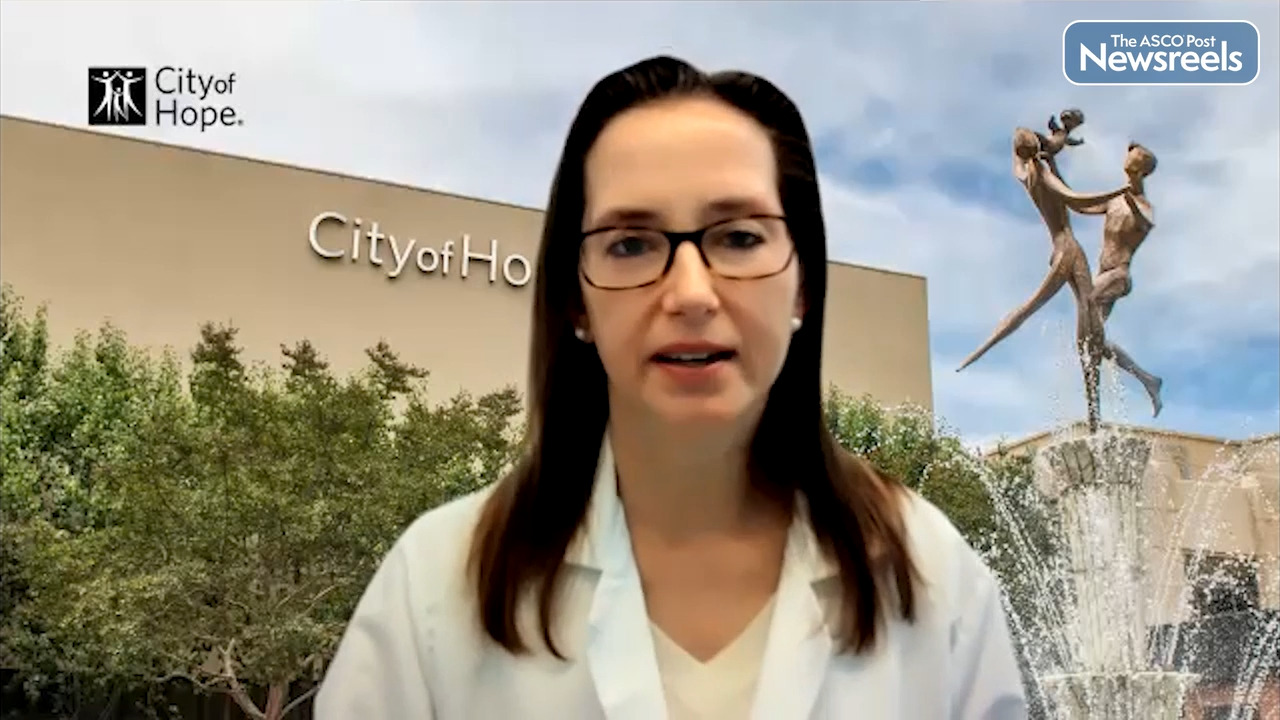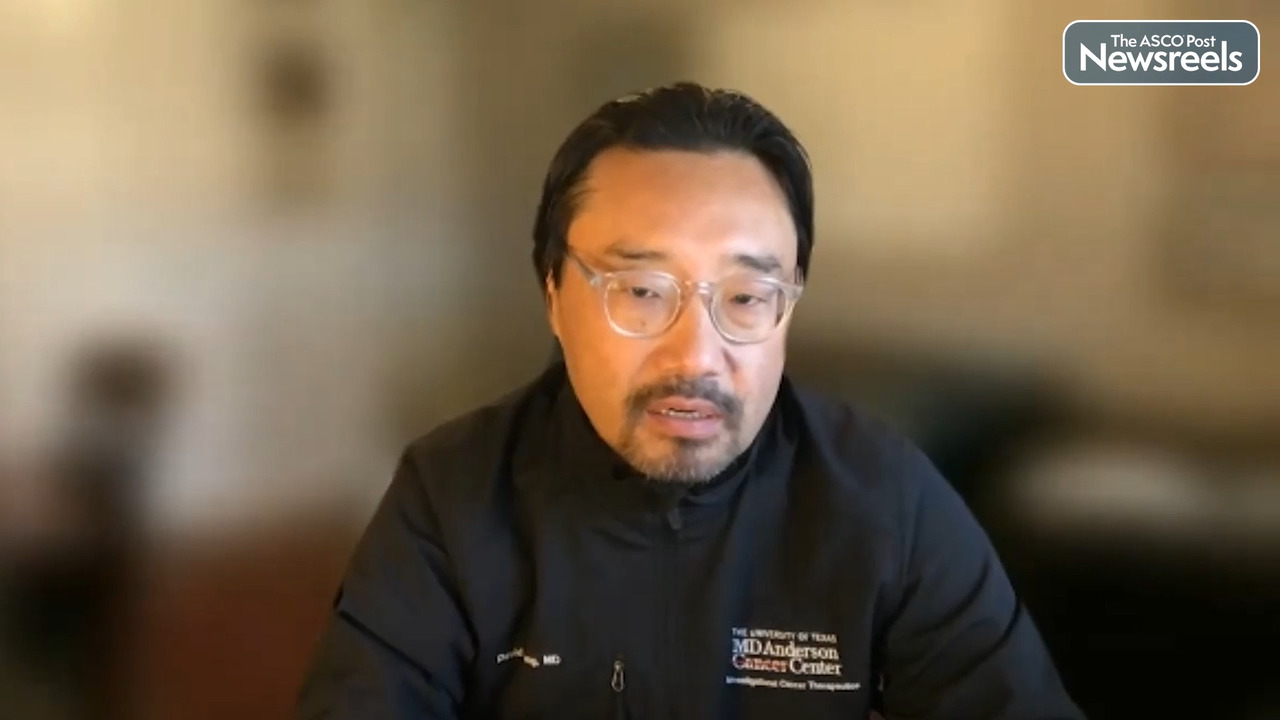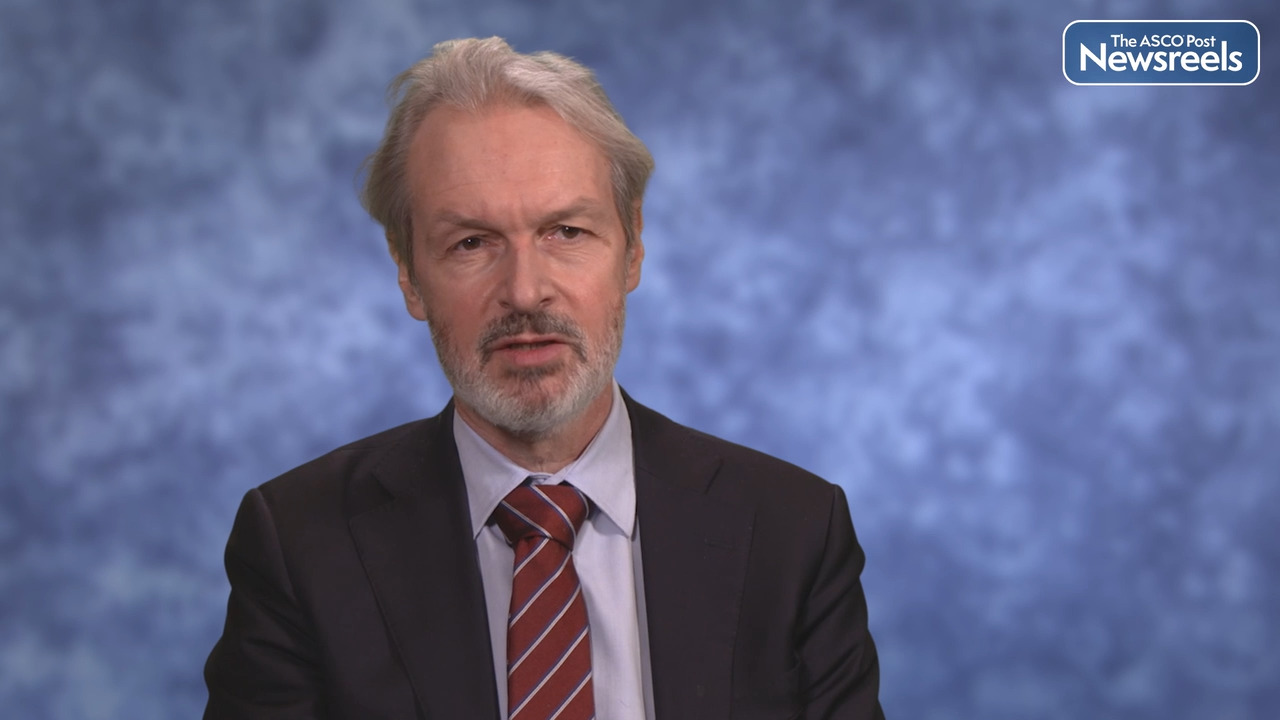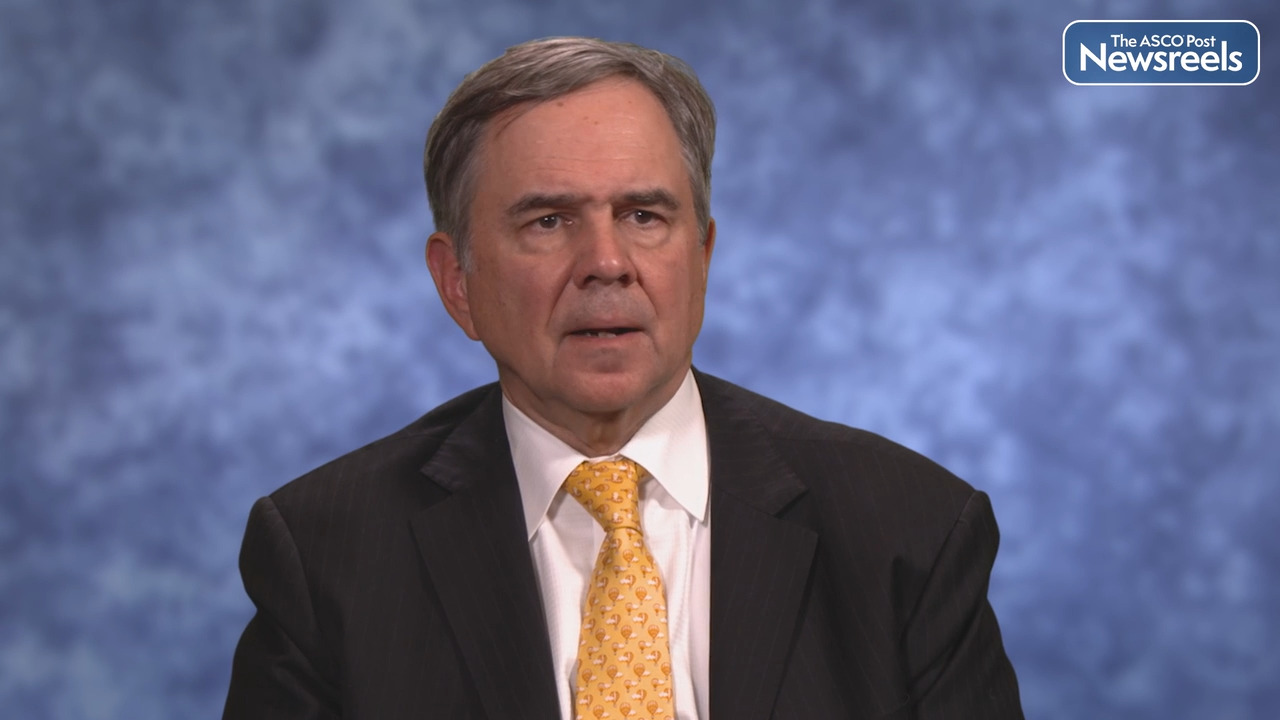Atezolizumab Induces Responses in Advanced Penile Cancer, but Biomarkers Needed to Improve Patient Selection
Use of the immune checkpoint inhibitor atezolizumab with or without radiotherapy showed antitumor activity in stage IV penile cancer in the phase II PERICLES trial, although the study failed to meet the primary endpoint of 1-year progression-free survival of at least 35%. The hints of activity were ...
ARIES Trial: Avelumab Failed to Improve 1-Year Survival in PD-L1–Positive Advanced Urothelial Cancer
First-line treatment with the PD-L1 antibody avelumab failed to meet the primary endpoint of an improvement in overall survival at 1 year for patients with cisplatin-ineligible, PD-L1–positive advanced urothelial cancer. However, the objective response and disease control rates were favorable in...
KEYNOTE-564 Update Supports Benefit of Adjuvant Pembrolizumab in High-Risk Renal Cell Carcinoma
An updated analysis of the phase III KEYNOTE-564 trial continues to support the use of adjuvant pembrolizumab vs placebo in patients with renal cell carcinoma at high risk of recurrence, according to a presentation at the 2022 ASCO Genitourinary Cancers Symposium.1 At 30 months of follow-up,...
The University of Texas MD Anderson Cancer Center Launches James P. Allison Institute
Today, The University of Texas MD Anderson Cancer Center launched the James P. Allison Institute, a visionary research and innovation hub within MD Anderson designed to foster groundbreaking science, to develop new treatments, and to bring the benefits of immunotherapy to all patients. The Allison...
Tanya B. Dorff, MD, on Prostate Cancer: Early Data on PSCA-Targeted CAR T-Cell Therapy
Tanya B. Dorff, MD, of City of Hope National Medical Center, discusses the first-in-human phase I findings showing that prostate stem cell antigen (PSCA) CAR T-cell therapy is feasible in patients with metastatic castration-resistant prostate cancer, with preliminary antitumor activity exhibited.
Sequencing of Drug Combinations Could Amplify Antitumor Immune Response in Liver Cancer
A new therapeutic strategy for hepatocellular carcinoma (HCC) that initially primes the tumor with an immune checkpoint inhibitor before using a multikinase inhibitor has shown efficacy in a study published in the Journal of the National Cancer Institute. Kikuchi et al reported that the new...
Atezolizumab Plus Chemoradiation Is Safe, Demonstrates Signs of Immune Activation in Patients With Cervical Cancer
A phase I/Ib trial conducted by the National Cancer Institute’s National Clinical Trials Network group NRG Oncology, NRG-GY017, concluded that the addition of the immunotherapy atezolizumab prior to and concurrently given with chemoradiation was safe for women with node-positive, locally advanced...
SORAYA Trial: Antibody-Drug Conjugate Produces Remissions in One-Third of Patients With Drug-Resistant Ovarian Cancer
In a clinical trial involving patients with ovarian cancer previously treated with platinum-based chemotherapy, a novel antibody-drug conjugate therapy produced a substantially better response than standard treatments, investigators from Dana-Farber Cancer Institute reported at the Society of...
Early Intrathecal Therapy for High-Grade ICANS in Patients Receiving CAR T-Cell Therapy
In a single-institution retrospective review reported in JAMA Oncology, Zurko et al found that early intrathecal therapy with hydrocortisone with or without intrathecal chemotherapy was effective in treating grade ≥ 3 immune effector cell–associated neurotoxicity syndrome (ICANS) in patients...
FDA Approves Pembrolizumab for Advanced Endometrial Carcinoma
On March 21, the U.S. Food and Drug Administration (FDA) approved pembrolizumab (Keytruda) as a single agent for patients with advanced endometrial carcinoma that is microsatellite instability–high or mismatch repair–deficient (as determined by an FDA-approved test). Eligible patients have disease...
Adjuvant Pembrolizumab May Improve Disease-Free Survival in Patients With Early-Stage NSCLC
Adjuvant pembrolizumab may improve disease-free survival compared to placebo in patients with early-stage non–small cell lung cancer (NSCLC) following complete resection and adjuvant chemotherapy when indicated, investigators from the PEARLS/KEYNOTE-091 trial reported in a European Society for...
Temozolomide Followed by Low-Dose Ipilimumab/Nivolumab in MSS and MGMT-Silenced Metastatic Colorectal Cancer
In an Italian phase II study (MAYA) reported in the Journal of Clinical Oncology, Morano et al found that patients with microsatellite-stable (MSS) and O6-methylguanine–DNA methyltransferase (MGMT)-silenced metastatic colorectal cancer without disease progression on temozolomide derived benefit...
FDA Approves Nivolumab/Relatlimab-rmbw for Unresectable or Metastatic Melanoma
On March 18, the U.S. Food and Drug Administration (FDA) approved nivolumab and relatlimab-rmbw (Opdualag) for adult and pediatric patients 12 years of age or older with unresectable or metastatic melanoma. The approved treatment is a fixed-dose combination of the LAG-3–blocking antibody relatlimab ...
Genitourinary Oncology 2021–2022 Almanac
The past year has witnessed tremendous advances in genitourinary oncology. I am pleased to review these findings in this year’s Genitourinary Oncology Almanac from The ASCO Post. I hope that you will find this roadmap helpful in highlighting a selection of these exciting developments. Checkpoint...
KEYNOTE-564 Update Supports Benefit of Adjuvant Pembrolizumab in High-Risk Renal Cell Carcinoma
An updated analysis of the phase III KEYNOTE-564 trial continues to support the use of adjuvant pembrolizumab vs placebo in patients with renal cell carcinoma at high risk of recurrence, according to a presentation at the 2022 ASCO Genitourinary Cancers Symposium.1 At 30 months of follow-up,...
KEYNOTE-564: Adjuvant Pembrolizumab Extends Disease-Free Survival in High-Risk Renal Cell Carcinoma
Adjuvant pembrolizumab following surgery significantly improved disease-free survival compared with placebo among patients with high-risk clear cell renal cell carcinoma (RCC), according to the international phase III KEYNOTE-564 study presented at the Plenary session during the 2021 ASCO Annual...
First-Line Nivolumab Plus Cabozantinib Improves Progression-Free and Overall Survival vs Sunitinib in Advanced Renal Cell Carcinoma
As reported in The New England Journal of Medicine by Toni K. Choueiri, MD, of Lank Center for Genitourinary Oncology, Dana-Farber Cancer Institute, and colleagues, the phase III CheckMate 9ER trial has shown that the combination of nivolumab and cabozantinib improved progression-free survival and...
Front-Line Toripalimab Plus Chemotherapy Improves Survival in Patients With Advanced NSCLC Without Actionable Mutations
Adding the PD-1 inhibitor toripalimab to chemotherapy significantly improved survival compared with chemotherapy alone in patients with advanced non–small cell lung cancer (NSCLC) without EGFR/ALK mutations, according to research presented by Wang et al during the March 2022 session of the ASCO...
Immunotherapy Duo Delays Disease Progression in Previously Untreated Patients With Melanoma: RELATIVITY-047
A novel immunotherapeutic combination that targets PD-1 and the LAG-3 pathway may significantly delay disease progression as a first-line treatment of advanced or unresectable melanoma. Updated results of the global phase III RELATIVITY-047 trial validated the study’s initial findings and were...
Adjuvant Nivolumab Improves Disease-Free Survival in High-Risk Muscle-Invasive Urothelial Carcinoma
As reported inThe New England Journal of Medicine by Dean F. Bajorin, MD, of the Department of Medicine, Memorial Sloan Kettering Cancer Center, and colleagues, an interim analysis of the phase III CheckMate 274 trial has shown improved disease-free survival with adjuvant nivolumab vs placebo...
Oncolytic Virus Plus Nivolumab Demonstrates Durable Response in Nonmelanoma Skin Cancer of the Head and Neck
Intratumor injection of the oncolytic virus RP1 in combination with the checkpoint inhibitor nivolumab has demonstrated durable antitumor activity in patients with nonmelanoma skin cancer of the head and neck, according to data presented at the 2022 Multidisciplinary Head and Neck Cancers...
David S. Hong, MD, on New Findings on Tisotumab Vedotin-tftv in Patients With Head and Neck Squamous Cell Carcinoma
David S. Hong, MD, of The University of Texas MD Anderson Cancer Center, discusses results from a phase II cohort, which suggest favorable antitumor activity with tisotumab vedotin-tftv in patients with head and neck squamous cell carcinoma that has progressed after treatment with a platinum-containing regimen. Additional research is warranted, says Dr. Hong, in the second-line setting as well as in treatment-naive patients in combinations with pembrolizumab and carboplatin.
Sumanta K. Pal, MD, on Advances in Genitourinary Cancer Treatment: Expert Perspective
Sumanta K. Pal, MD, of City of Hope National Medical Center, discusses some key research developments in kidney cancer, including data on nivolumab and ipilimumab with or without CBM588 in metastatic renal cell carcinoma; intestinal microbiome associated with the development of grade 3 or 4 adverse events in patients with metastatic disease who have been treated with nivolumab plus ipilimumab and probiotic support; the link between TERT promoter mutations and clinical outcome with immune checkpoint inhibitor therapy for advanced urothelial cancer; mutations in the androgen receptor gene in patients with prostate cancer receiving novel androgen deprivation treatments; and findings on waning antibody titers in patients who have received COVID-19 vaccinations (Roundup of Abstracts 371, 561, 374, Posters 38 and 48).
KEYNOTE-564 Update Supports Benefit of Adjuvant Pembrolizumab in High-Risk Renal Cell Carcinoma
An updated analysis of the phase III KEYNOTE-564 trial continues to support the use of adjuvant pembrolizumab vs placebo in patients with renal cell carcinoma at high risk of recurrence, according to a presentation at the 2022 ASCO Genitourinary Cancers Symposium.1 At 30 months of follow-up,...
Time for a Radical Change in the Treatment of Endometrial Cancer: KEYNOTE-775 and Beyond
I had the privilege of sitting in a meeting on the treatment of endometrial cancer as a junior investigator in January 2015 where a representative from the U.S. Food and Drug Administration was present. The topic of the meeting was on how to design the next endometrial cancer trials. I remember...
Lenvatinib/Pembrolizumab Improves Progression-Free and Overall Survival vs Chemotherapy in Previously Treated Advanced Endometrial Cancer
As reported in The New England Journal of Medicine by Vicky Makker, MD, of Memorial Sloan Kettering Cancer Center, and colleagues, the phase III Study 309/KEYNOTE-775 trial has shown prolonged progression-free and overall survival with lenvatinib plus pembrolizumab vs physician’s choice of...
Expert Point of View: Matthew Genyeh Mei, MD
American Society of Hematology (ASH) session co-moderator Matthew Genyeh Mei, MD, Associate Professor, Hematologic Malignancies and Stem Cell Transplantation Institute of City of Hope in Southern California, said the studies of checkpoint inhibitors in newly diagnosed and previously treated Hodgkin ...
Combinations Advance the Power of Pembrolizumab in Hodgkin Lymphoma
Pembrolizumab monotherapy is an established treatment strategy for relapsed or refractory classical Hodgkin lymphoma. In combination with chemotherapy, the checkpoint inhibitor is also showing value in the front-line setting and further boosting outcomes in the relapsed setting, according to...
Expert Point of View: Stefano Cascinu, MD
Stefano Cascinu, MD, of the Comprehensive Cancer Center, Università Vita-Salute, IRCCS-Ospedale San Raffaele, Milan, Italy, was the invited discussant of KEYNOTE-5901 and CheckMate 649.2 “These landmark studies could change the treatment paradigm of advanced esophageal and gastric cancers. They...
Checkpoint Inhibitors in Esophagogastric Cancer: Updates of Landmark Trials
Updates of landmark trials of immune checkpoint inhibitors as first-line therapy for advanced HER2-negative esophagogastric cancers were presented at the 2022 ASCO Gastrointestinal Cancers Symposium. The studies upheld previous findings of an overall survival benefit when these agents are paired...
Expert Point of View: Christopher Willett, MD
Christopher Willett, MD, Professor and Chair of the Department of Radiation Oncology at Duke University in Durham, North Carolina, shared his thoughts on the findings of the study by Lumish et al1 with The ASCO Post. He first noted the shift in recent years toward total neoadjuvant therapy in the...
Small Study Reports Neoadjuvant PD-1 Blockade Yields 100% Clinical Complete Response Rate in Locally Advanced Mismatch Repair–Deficient Rectal Cancer
In a small study of patients with locally advanced mismatch repair–deficient (dMMR) rectal cancer, treatment with the anti–PD-1 agent dostarlimab-gxly alone led to a clinical complete response rate of 100%. The findings of this study from Memorial Sloan Kettering Cancer Center (MSK) were reported...
Expert Point of View: Samuel J. Klempner, MD
Samuel J. Klempner, MD, Associate Professor at Massachusetts General Hospital and Harvard Medical School, commented on the NEONIPIGA study for The ASCO Post. “This study was the first prospective data set to show what many have suspected—that neoadjuvant immune checkpoint blockade would lead to a...
Neoadjuvant Checkpoint Inhibitor Doublet Yields Complete Responses in Gastroesophageal Cancers
In patients with resectable microsatellite instability–high (MSI-H)/mismatch repair–deficient (dMMR) gastric and gastroesophageal junction adenocarcinoma, dual checkpoint inhibition with ipilimumab and nivolumab given as neoadjuvant therapy led to a pathologic complete response rate of 58.6%,...
Expert Point of View: Benoit Rousseau, MD, PhD
Benoit Rousseau, MD, PhD, of Memorial Sloan Kettering Cancer Center, New York, called the findings of the phase II GERCOR NIPICOL trial “interesting and convincing.” Long-term follow-up showed the 3-year progression-free survival rate to be 70% after just 1 total year of treatment with nivolumab...
NIPICOL Trial: Promising Outcomes With Shorter Duration of Checkpoint Inhibition in Metastatic Colorectal Cancer
The phase II GERCOR NIPICOL study evaluated 1 year of treatment with nivolumab plus ipilimumab in patients with chemotherapy-resistant metastatic colorectal cancer whose tumors were microsatellite instability–high (MSI-H) or mismatch repair–deficient (dMMR). With this shortened treatment duration,...
Petros Grivas, MD, PhD, on Urothelial Cancer: New Data on Sacituzumab Govitecan-hziy and Pembrolizumab
Petros Grivas, MD, PhD, of the University of Washington and Fred Hutchinson Cancer Research Center, discusses results from Cohort 3 of the TROPHY-U-01 study, which assessed sacituzumab govitecan-hziy in combination with pembrolizumab in patients with metastatic urothelial cancer who experienced disease progression after platinum-based regimens (Abstract 434).
Toni K. Choueiri, MD, on Renal Cell Carcinoma: Follow-up Data on Pembrolizumab
Toni K. Choueiri, MD, of Dana-Farber Cancer Institute, discusses a 30-month follow-up of results from the KEYNOTE-564 trial, which further support the use of adjuvant pembrolizumab when treating patients with renal cell carcinoma at intermediate-high or high risk of recurrence, or with an M1 NED (no evidence of disease) status after nephrectomy. The data show a disease-free survival benefit vs placebo (Abstract 290).
Updated Findings on T-DXd in Gastrointestinal Malignancies
Updates of phase II studies evaluating fam-trastuzumab deruxtecan-nxki (T-DXd) in gastrointestinal cancers were presented at the 2022 ASCO Gastrointestinal Cancers Symposium, continuing to offer support for the antibody-drug conjugate in these malignancies. In HER2-expressing gastric cancer, T-DXd...
Jonathan E. Rosenberg, MD, on Urothelial Cancer: New Conclusions About Durvalumab Plus Olaparib
Jonathan E. Rosenberg, MD, of Memorial Sloan Kettering Cancer Center, discusses phase II findings from the BAYOU trial, which studied durvalumab in combination with olaparib for first-line treatment of platinum-ineligible patients with unresectable, stage IV urothelial carcinoma. Because secondary analyses indicated a potential progression-free survival benefit with this combination, there may be a role for PARP inhibitors in the treatment of advanced disease with homologous recombination repair mutation (Abstract 437).
Pathologic Response of Index Lymph Node and Concordance With Total Nodal Basin Pathologic Response in Stage III Melanoma
In a retrospective analysis reported in JAMA Surgery, Reijers et al found that pathologic response in largest lymph node metastasis (index lymph node [ILN]) was highly concordant with response in the total lymph node bed in patients with stage III melanoma receiving neoadjuvant...
FDA Approves Neoadjuvant Nivolumab and Platinum Doublet Chemotherapy for Early-Stage NSCLC
On March 4, the U.S. Food and Drug Administration (FDA) approved nivolumab (Opdivo) in combination with platinum-doublet chemotherapy for adult patients with resectable non–small cell lung cancer (NSCLC) in the neoadjuvant setting. This represents the first FDA approval for neoadjuvant therapy for...
FDA Approves Ciltacabtagene Autoleucel for Relapsed or Refractory Multiple Myeloma
On February 28, the U.S. Food and Drug Administration (FDA) approved ciltacabtagene autoleucel (Carvykti) for the treatment of adults with relapsed or refractory multiple myeloma after four or more prior lines of therapy, including a proteasome inhibitor, an immunomodulatory agent, and an anti-CD38 ...
Axicabtagene Ciloleucel vs Standard of Care as Second-Line Treatment for Large B-cell Lymphoma
As reported in The New England Journal of Medicine by Frederick L. Locke, MD, and colleagues, the phase III ZUMA-7 trial of patients with large B-cell lymphoma has shown improved event-free survival with second-line axicabtagene ciloleucel vs chemoimmunotherapy with high-dose chemotherapy and...
Interim Analysis of Overall Survival in ICARIA-MM: Addition of Isatuximab to Pomalidomide/Dexamethasone in Relapsed or Refractory Multiple Myeloma
As reported in The Lancet Oncology by Paul G. Richardson, MD, and colleagues, a prespecified interim overall survival analysis of the phase III ICARIA-MM trial showed that the addition of isatuximab to pomalidomide and dexamethasone in patients with relapsed or refractory multiple myeloma produced...
Axel Bex, MD, PhD, on Renal Cell Carcinoma: New Findings From the NeoAvAx Trial on Avelumab and Axitinib
Axel Bex, MD, PhD, of The Netherlands Cancer Institute, discusses an efficacy, safety, and biomarker analysis of neoadjuvant avelumab and axitinib in patients with localized renal cell carcinoma who are at high risk of relapse after nephrectomy (Abstract 289).
Daniel P. Petrylak, MD, on Bladder Cancer: Study EV-103 Cohort H Findings on Enfortumab Vedotin-ejfv
Daniel P. Petrylak, MD, of Yale Cancer Center, discusses new data on the antitumor activity of neoadjuvant treatment with enfortumab vedotin-ejfv monotherapy in patients with muscle-invasive bladder cancer who are not eligible for cisplatin.
Hielke-Martijn de Vries, MD, on Penile Cancer: New Data on Atezolizumab and Radiotherapy
Hielke-Martijn de Vries, MD, of the Netherlands Cancer Institute, discusses phase II findings on the use of atezolizumab with or without radiotherapy for patients with advanced squamous cell carcinoma of the penis. The study was designed to address the poor prognosis for this disease by exploring whether a protracted schedule of radiotherapy for locoregional disease, in combination with immunotherapy, could improve outcomes (Abstract 3).
KEYNOTE-522: Event-Free Survival With Neoadjuvant and Adjuvant Pembrolizumab in Triple-Negative Breast Cancer
As reported in The New England Journal of Medicine by Peter Schmid, MD, PhD, and colleagues, a preplanned interim analysis of the phase III KEYNOTE-522 trial has shown improved event-free survival with the addition of pembrolizumab to neoadjuvant chemotherapy, followed by adjuvant pembrolizumab, in ...
FDA Approves FoundationOne CDx as a Companion Diagnostic for Pembrolizumab to Identify Patients With MSI-H Solid Tumors
On February 21, the U.S. Food and Drug Administration (FDA) approved FoundationOne CDx to be used as a companion diagnostic to identify patients with microsatellite instability–high (MSI-H) status solid tumors who may be appropriate candidates for treatment with pembrolizumab. FoundationOne CDx is...









